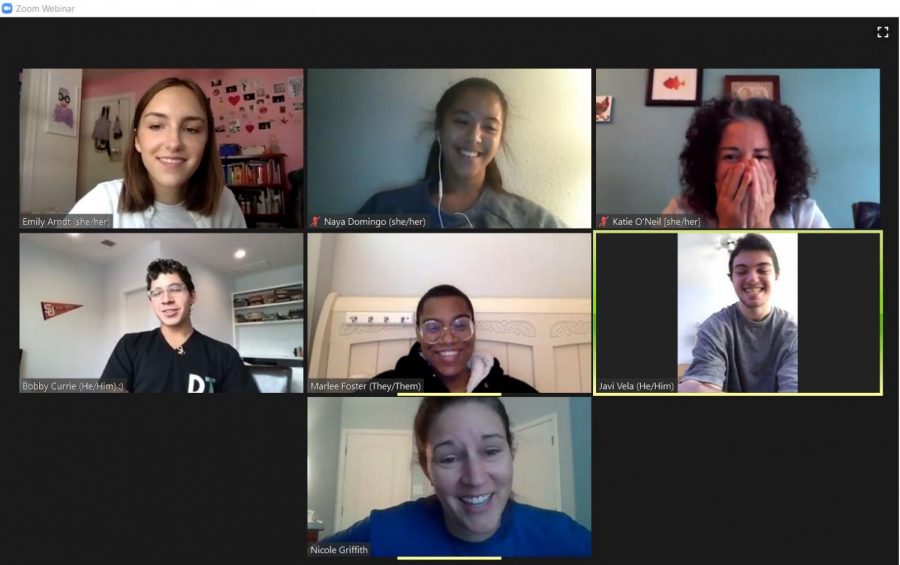Student equity panel speaks its truth to teachers
Five upperclassmen urge Maculty to be actively anti-racist to help all students have equal opportunity for success
At the end of the Wednesday’s student panel on equity, principal Nicole Griffith congratulated the panel on a job well done. Photo by Dave Winter.
August 31, 2020
Teachers have been working the last few weeks to get ready for the start of school, but on Wednesday morning they became the students while five Student Leadership Team upperclassmen became their teachers.
In a zoom webinar moderated by Austin ISD Social Emotional Learning specialist Katie O’Neil, seniors Marlee Foster, Javier Vela and Emily Arndt and juniors Bobby Currie and Naya Domingo spoke about their personal experiences at Mac and suggested schoolwide actions that could make McCallum a more equitable campus where all students, regardless of their skin color or gender identity, could enjoy the same statistical likelihood of experiencing success in the classroom and beyond.
The panelists encouraged teachers to strive for more diversity in their curricula and on the physical walls of their classrooms. They urged teachers not only to recruit more minority students in advanced classes and in demanding extracurricular and fine arts programs but also to take steps to make sure that BIPOC (black, indigenous and people of color) and LGTBQ+ students feel welcome and capable of success once there.
Domingo also pointed out that teachers need to encourage students and their parents to stop thinking of certain activities like the AVID program as primarily intended for minorities when all students could benefit from what the college preparatory program has to offer.
They discussed the casual racism often overheard in the hallway during passing periods and urged teachers to acknowledge, address and work to eliminate microaggressions in their classrooms so that students can learn to stop these subtle and often unintended but still harmful acts of discrimination.
The session was characterized by the panelists collegiality and respect for each other. When asked to isolate the best moment of the session, Domingo chose two points that were made by her fellow panelists.
“For me. [the most powerful moments were] when Bobby talked about being actively anti-racist and adding to the solution rather than just not being part of the problem [and] when Emily said everyone should be fought for equally in terms of switching out of pre-AP and AP courses. I feel like those two things really drew everything together.”
At a couple of points during the Wednesday webinar, speakers had to pause due to nerves, and Currie and Foster both said that teachers’ response in those moments was uplifting.
“The session went really well,” Domingo said. “I was amazed at how receptive the teachers were and how encouraging they were. It was really special and I feel good that I got to be completely honest, and it was received well.”
While the event was successful, the panelists insisted it is but one positive step in a long journey the campus must take to achieve true equity.
“I hope that in this upcoming year, teachers come to school as students as well, because as we learn from them, they can also learn from us. Listening, educating and understanding should be a goal in everybody’s minds.”
Currie urged teachers not just to avoid being racist but to be actively anti-racist.
“I want to see faculty breaking out of their comfort bubble,” he said. “I want to see a change from not being a part of the problem to actively becoming part of the solution. … This will help change McCallum from good to great.”
Domingo agreed.
“I think we need to take what we said and what we learned and actually apply to our school,” she said. “This shouldn’t be the end of the conversation/action. This tough conversation needs to continue and we need to take action within our school to make a change.”
Foster laid out the challenge in concrete and simple terms.
“This is a fight against prejudice,” they said, “but there is no villain. We are all here to try and help each other out, students to teachers, and teachers to students. The more we work on promoting equity in our school, the better school we’ll become.”




